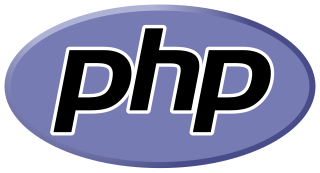
PHP is a general-purpose scripting language geared towards web development. It was originally created by Danish-Canadian programmer Rasmus Lerdorf in 1993 and released in 1995. The PHP reference implementation is now produced by the PHP Group. PHP was originally an abbreviation of Personal Home Page, but it now stands for the recursive initialism PHP: Hypertext Preprocessor.
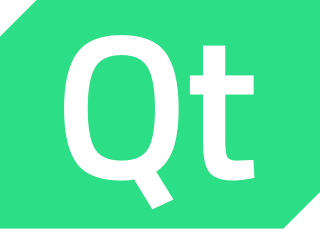
Qt is cross-platform software for creating graphical user interfaces as well as cross-platform applications that run on various software and hardware platforms such as Linux, Windows, macOS, Android or embedded systems with little or no change in the underlying codebase while still being a native application with native capabilities and speed.
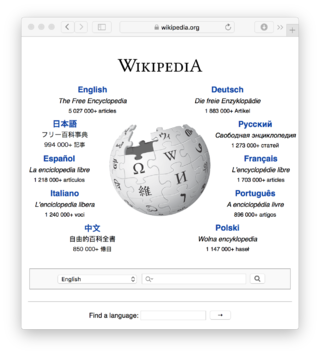
Wiki software is collaborative software that runs a wiki, which allows the users to create and collaboratively edit pages or entries via a web browser. A wiki system is usually a web application that runs on one or more web servers. The content, including previous revisions, is usually stored in either a file system or a database. Wikis are a type of web content management system, and the most commonly supported off-the-shelf software that web hosting facilities offer.

KDevelop is a free and open-source integrated development environment (IDE) for Unix-like computer operating systems and Windows. It provides editing, navigation and debugging features for several programming languages, and integration with build automation and version-control systems, using a plugin-based architecture.

gedit is a text editor designed for the GNOME desktop environment. It was GNOME's default text editor and part of the GNOME Core Applications until GNOME version 42 in March 2022, which changed the default text editor to GNOME Text Editor. Designed as a general-purpose text editor, gedit emphasizes simplicity and ease of use, with a clean and simple GUI, according to the philosophy of the GNOME project. It includes tools for editing source code and structured text such as markup languages.

Doxygen is a documentation generator and static analysis tool for software source trees. When used as a documentation generator, Doxygen extracts information from specially-formatted comments within the code. When used for analysis, Doxygen uses its parse tree to generate diagrams and charts of the code structure. Doxygen can cross reference documentation and code, so that the reader of a document can easily refer to the actual code.

VLC media player is a free and open-source, portable, cross-platform media player software and streaming media server developed by the VideoLAN project. VLC is available for desktop operating systems and mobile platforms, such as Android, iOS and iPadOS. VLC is also available on digital distribution platforms such as Apple's App Store, Google Play, and Microsoft Store.
A lightweight markup language (LML), also termed a simple or humane markup language, is a markup language with simple, unobtrusive syntax. It is designed to be easy to write using any generic text editor and easy to read in its raw form. Lightweight markup languages are used in applications where it may be necessary to read the raw document as well as the final rendered output.

DokuWiki is an open source wiki application licensed under GPLv2 and written in the PHP programming language. It works on plain text files and thus does not need a database. Its syntax is similar to the one used by MediaWiki. It is often recommended as a more lightweight, easier to customize alternative to MediaWiki. The 'Doku' in DokuWiki is short for Dokumentation which in German means documentation.

PyQt is a Python binding of the cross-platform GUI toolkit Qt, implemented as a Python plug-in. PyQt is free software developed by the British firm Riverbank Computing. It is available under similar terms to Qt versions older than 4.5; this means a variety of licenses including GNU General Public License (GPL) and commercial license, but not the GNU Lesser General Public License (LGPL). PyQt supports Microsoft Windows as well as various kinds of UNIX, including Linux and MacOS.
Plain Old Documentation (pod) is a lightweight markup language used to document the Perl programming language as well as Perl modules and programs.
An INI file is a configuration file for computer software that consists of a text-based content with a structure and syntax comprising key–value pairs for properties, and sections that organize the properties. The name of these configuration files comes from the filename extension INI, for initialization, used in the MS-DOS operating system which popularized this method of software configuration. The format has become an informal standard in many contexts of configuration, but many applications on other operating systems use different file name extensions, such as conf and cfg.
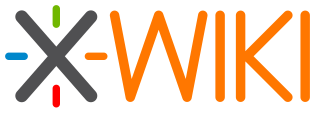
XWiki is a free wiki software platform written in Java with a design emphasis on extensibility. XWiki is an enterprise wiki. It includes WYSIWYG editing, OpenDocument based document import/export, semantic annotations and tagging, and advanced permissions management.
A personal wiki is wiki software that allows individual users to organize information on their desktop or mobile computing devices in a manner similar to community wikis, but without collaborative software or multiple users.

The history of wikis began in 1994, when Ward Cunningham gave the name "WikiWikiWeb" to the knowledge base, which ran on his company's website at c2.com, and the wiki software that powered it. The wiki went public in March 1995, the date used in anniversary celebrations of the wiki's origins. c2.com is thus the first true wiki, or a website with pages and links that can be easily edited via the browser, with a reliable version history for each page. He chose "WikiWikiWeb" as the name based on his memories of the "Wiki Wiki Shuttle" at Honolulu International Airport, and because "wiki" is the Hawaiian word for "quick".
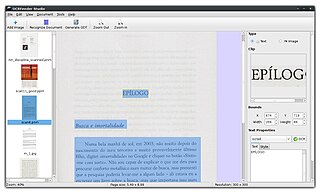
OCRFeeder is an optical character recognition suite for GNOME, which also supports virtually any command-line OCR engine, such as CuneiForm, GOCR, Ocrad and Tesseract. It converts paper documents to digital document files and can serve to make them accessible to visually impaired users.
The following outline is provided as an overview of and topical guide to the Perl programming language:

Zim is a graphical text editor designed to maintain a collection of locally stored wiki-pages, a personal wiki. Each wiki-page can contain things like text with simple formatting, links to other pages, attachments, and images. Additional plugins, such as an equation editor and spell-checker, are also available. The wiki-pages are stored in a folder structure in plain text files with wiki formatting. Zim can be used with the Getting Things Done method.












